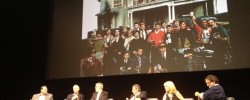
Review: The Hunt (2012)

Cast: Mads Mikkelsen, Thomas Bo Larsen, Annika Wedderkopp
Director: Thomas Vinterberg
Country: Denmark
Genre: Drama
Official Trailer: Here
Editor’s Note: The Hunt opens in limited release today, July 12th
To American audiences, Mads Mikkelsen is the high-cheekboned face of NBC’s Hannibal, his steely glare that of a well-mannered psychotic with a fondness for human flesh. He’s recognised for a cannibalistic character in his native Denmark too, albeit with far more comic connotations in Anders Thomas Jensen’s The Green Butchers. So stark a difference is emblematic of the contrasting personae Mikkelsen maintains either side of the Atlantic, which makes all the more interesting his casting as Lucas, a kindergarten teacher accused of sexual abuse, in Thomas Vinterberg’s The Hunt. It’s not hard to imagine an Anglophone audience immediately believing his culpability, his evil range considered, nor is it conceivable that a Danish crowd, for whom he has often played concerned fathers, would consider his innocence.
It’s an agonising film to watch, the kind that puts the audience in a position of heated frustration where the temptation to scream instructions at the screen is almost unbearable; we can only look on, horrified, as misunderstanding gives way to a malice and a man’s life crumbles before our eyes.
 Vinterberg himself is no stranger to this sort of duplicitous fortune in different markets. He launched his career—and the Dogme 95 movement, and with it arguably even modern Danish cinema at large—with 1998’s The Celebration, before the dual English-language failures of It’s All About Love and Dear Wendy forced him back to his native tongue. The Hunt is very much a return to roots, focusing as it does on the same controversial topic of child abuse on which The Celebration was gradually revealed to be founded, though from a distinctly different angle. Co-scripted with Tobias Lindholm—himself now making waves as director of the achingly tense A Hijacking—the drama establishes early on that this accusation is rooted in the momentary anger of a chided child, paving the way for Vinterberg’s exploration not so much of sexual scandal as of the tantalising inevitabilities of accusation.
Vinterberg himself is no stranger to this sort of duplicitous fortune in different markets. He launched his career—and the Dogme 95 movement, and with it arguably even modern Danish cinema at large—with 1998’s The Celebration, before the dual English-language failures of It’s All About Love and Dear Wendy forced him back to his native tongue. The Hunt is very much a return to roots, focusing as it does on the same controversial topic of child abuse on which The Celebration was gradually revealed to be founded, though from a distinctly different angle. Co-scripted with Tobias Lindholm—himself now making waves as director of the achingly tense A Hijacking—the drama establishes early on that this accusation is rooted in the momentary anger of a chided child, paving the way for Vinterberg’s exploration not so much of sexual scandal as of the tantalising inevitabilities of accusation.
How many of us can honestly claim to have never taken a charge as equivalent to a condemnation? The Hunt predicates itself on the immolation this small community—well-established in an affable opening act—unleashes upon Lucas ever before he has a chance to defend himself, accusation and assumption going hand-in-hand to destroy every aspect of this man’s existence. Vinterberg’s brilliant dramatic coup is to establish the conflict as entirely blameless: Lucas, of course, is innocent; the child, goaded by appalled adults, lies only out of fear and confusion; the community, forged on speculation and supposition, has no reason to believe a kid would fabricate this tale. It’s an agonising film to watch, the kind that puts the audience in a position of heated frustration where the temptation to scream instructions at the screen is almost unbearable; we can only look on, horrified, as misunderstanding gives way to a malice and a man’s life crumbles before our eyes.
What pain there is cast across his face, what agonised frustration as colleagues decry him and friends deny him, what sheer, sorry desperation as he finds himself alone in the dark.
 The film would falter without a performance as superlative as Mikkelsen’s. Deserved winner of the Best Actor trophy at Cannes last year, he exceeds himself here, his physical transformation across the drama as the life drains from his face nothing short of extraordinary. What pain there is cast across his face, what agonised frustration as colleagues decry him and friends deny him, what sheer, sorry desperation as he finds himself alone in the dark. There’s an incredible scene toward the film’s conclusion where he determinedly attends a community event, his face bearing as many emotional bruises as physical, his eyes those of a man worn to the point of exhaustion. Here Mikkelsen is as a titan of the silent era, his quiet mannerisms, the slack of his shoulders, the movement of his eyes saying in seconds what the entirety of the script’s dialogue cannot.
The film would falter without a performance as superlative as Mikkelsen’s. Deserved winner of the Best Actor trophy at Cannes last year, he exceeds himself here, his physical transformation across the drama as the life drains from his face nothing short of extraordinary. What pain there is cast across his face, what agonised frustration as colleagues decry him and friends deny him, what sheer, sorry desperation as he finds himself alone in the dark. There’s an incredible scene toward the film’s conclusion where he determinedly attends a community event, his face bearing as many emotional bruises as physical, his eyes those of a man worn to the point of exhaustion. Here Mikkelsen is as a titan of the silent era, his quiet mannerisms, the slack of his shoulders, the movement of his eyes saying in seconds what the entirety of the script’s dialogue cannot.
Sequences such as this, exploiting to the full the brilliance of one of the finest working actors, are what give The Hunt the emotional enormity to make it the great movie it is. But it’s far more a film of moments than it is a particularly momentous film, a collage of exhausting dramatic excerpts rather than a complete consolidation of its thematic considerations. Perhaps that’s precisely the point: the story Vinterberg tells is incapable of being resolved in any entirely satisfying way, immune to sound summation with one conclusion or another. It’s just another insolvable inevitability of our kind: we dwell, we dwindle, and we do not let go.
Related Posts
![]()
Ronan Doyle
![]()
Latest posts by Ronan Doyle (see all)































